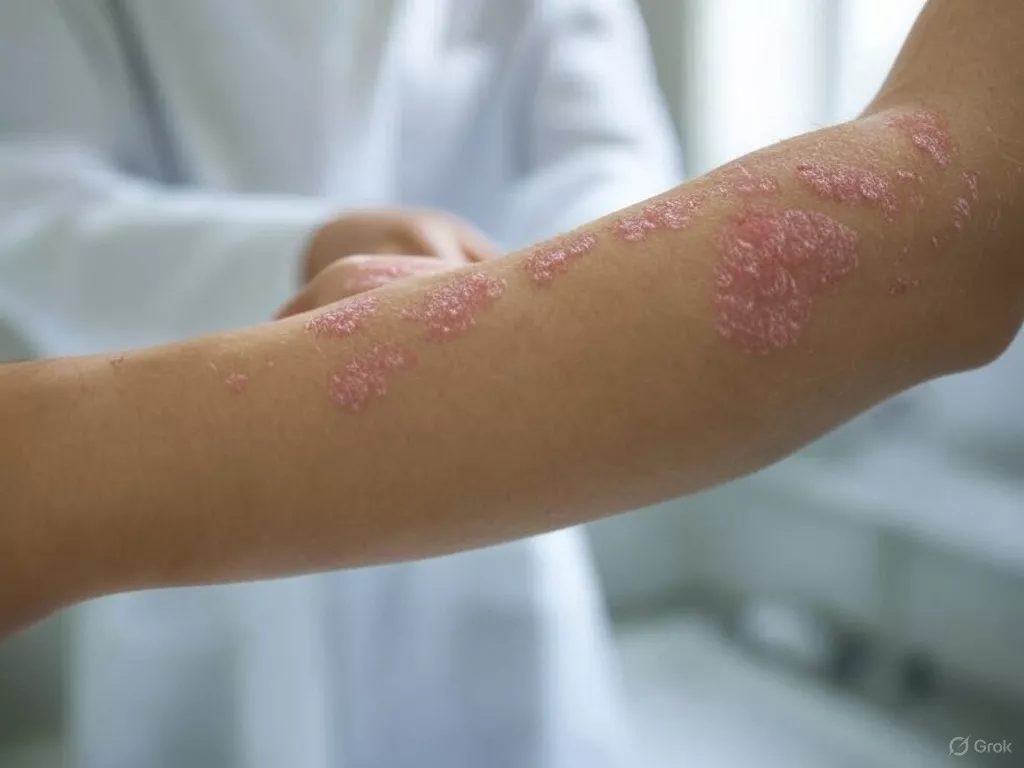Description
Psoriasis is a chronic skin condition that affects millions of people around the world. It is characterized by red, scaly patches on the skin that can be itchy, painful, and uncomfortable. Psoriasis can range from mild to severe and can affect any part of the body. While there is no cure for psoriasis, there are treatments available to help manage the symptoms.
The exact cause of psoriasis is unknown, but it is believed to be related to an overactive immune system. Genetics may also play a role in the development of psoriasis. Certain triggers, such as stress, certain medications, and infections, can cause flare-ups of psoriasis.
Treatment for psoriasis can include topical creams, light therapy, and oral medications. Topical creams can help reduce inflammation and itching, while light therapy can help slow the growth of skin cells. Oral medications can help reduce inflammation and suppress the immune system.
Living with psoriasis can be difficult, but there are ways to manage the condition. It is important to avoid triggers, such as stress, and to keep the skin moisturized. Eating a healthy diet, exercising regularly, and getting enough sleep can also help manage symptoms.
Psoriasis is a chronic condition, but with the right treatment and lifestyle changes, it can be managed. If you are living with psoriasis, talk to your doctor about the best treatment options for you.
Benefits
Psoriasis is a chronic skin condition that affects millions of people around the world. It is characterized by red, scaly patches on the skin that can be itchy, painful, and embarrassing.
The benefits of treating psoriasis include:
1. Improved Appearance: Treatments for psoriasis can help reduce the appearance of red, scaly patches on the skin, making it easier to feel more confident in your appearance.
2. Reduced Pain and Discomfort: Treatments for psoriasis can help reduce the itching, burning, and pain associated with the condition.
3. Improved Quality of Life: Treatments for psoriasis can help improve your quality of life by reducing the physical and emotional discomfort associated with the condition.
4. Reduced Risk of Complications: Treatments for psoriasis can help reduce the risk of complications such as infection, skin cancer, and other skin conditions.
5. Improved Self-Esteem: Treatments for psoriasis can help improve your self-esteem by reducing the physical and emotional discomfort associated with the condition.
6. Improved Mental Health: Treatments for psoriasis can help improve your mental health by reducing the stress and anxiety associated with the condition.
7. Reduced Risk of Other Health Conditions: Treatments for psoriasis can help reduce the risk of other health conditions such as heart disease, stroke, and diabetes.
8. Improved Overall Health: Treatments for psoriasis can help improve your overall health by reducing the physical and emotional discomfort associated with the condition.
By treating psoriasis, you can enjoy improved appearance, reduced pain and discomfort, improved quality of life, reduced risk of complications, improved self-esteem, improved mental health, reduced risk of other health conditions, and improved overall health.
Tips
1. Avoid triggers: Identify and avoid activities, foods, and environmental factors that may trigger your psoriasis. Common triggers include stress, smoking, alcohol, and certain medications.
2. Moisturize: Moisturizing your skin regularly can help reduce the symptoms of psoriasis. Use a moisturizer that is specifically designed for sensitive skin.
3. Sunlight: Sunlight can help reduce the symptoms of psoriasis. Try to get at least 15 minutes of direct sunlight each day.
4. Diet: Eating a healthy, balanced diet can help reduce the symptoms of psoriasis. Avoid processed foods, sugar, and saturated fats. Eat plenty of fruits, vegetables, and whole grains.
5. Exercise: Regular exercise can help reduce stress and improve your overall health. Try to get at least 30 minutes of exercise each day.
6. Stress management: Stress can worsen the symptoms of psoriasis. Try to find ways to manage your stress, such as yoga, meditation, or deep breathing.
7. Topical treatments: There are a variety of topical treatments available to help reduce the symptoms of psoriasis. Talk to your doctor about which one is right for you.
8. Oral medications: Oral medications can help reduce the symptoms of psoriasis. Talk to your doctor about which one is right for you.
9. Phototherapy: Phototherapy, or light therapy, can help reduce the symptoms of psoriasis. Talk to your doctor about which type of phototherapy is right for you.
10. Alternative therapies: Alternative therapies, such as acupuncture, herbal remedies, and aromatherapy, may help reduce the symptoms of psoriasis. Talk to your doctor about which one is right for you.
